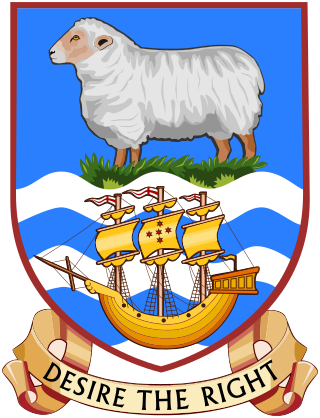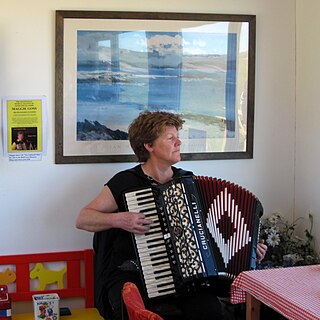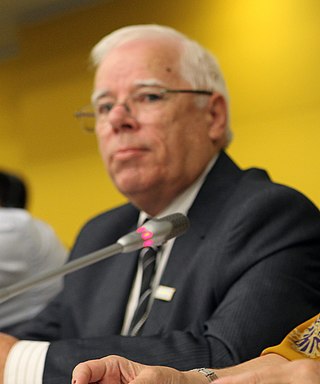Related Research Articles

The history of the Falkland Islands goes back at least five hundred years, with active exploration and colonisation only taking place in the 18th century. Nonetheless, the Falkland Islands have been a matter of controversy, as they have been claimed by the French, British, Spaniards and Argentines at various points.

The politics of the Falkland Islands takes place in a framework of a constitutional monarchy and parliamentary representative democratic dependency as set out by the constitution, whereby the Governor exercises the duties of head of state in the absence of the monarch and the Chief Executive is the head of the Civil Service, with an elected Legislative Assembly to propose new laws, national policy, approve finance and hold the executive to account.
The economy of the Falkland Islands, which first involved sealing, whaling and provisioning ships, became heavily dependent on sheep farming from the 1870s to 1980. It then diversified and now has income from tourism, commercial fishing, and servicing the fishing industry as well as agriculture. The Falkland Islands use the Falkland pound, which is backed by the British pound.

The Falklands War was a ten-week undeclared war between Argentina and the United Kingdom in 1982 over two British dependent territories in the South Atlantic: the Falkland Islands and its territorial dependency, South Georgia and the South Sandwich Islands. The conflict began on 2 April, when Argentina invaded and occupied the Falkland Islands, followed by the invasion of South Georgia the next day. On 5 April, the British government dispatched a naval task force to engage the Argentine Navy and Air Force before making an amphibious assault on the islands. The conflict lasted 74 days and ended with an Argentine surrender on 14 June, returning the islands to British control. In total, 649 Argentine military personnel, 255 British military personnel, and three Falkland Islanders were killed during the hostilities.

Stanley is the capital city of the Falkland Islands. It is located on the island of East Falkland, on a north-facing slope in one of the wettest parts of the islands. At the 2016 census, the city had a population of 2,460. The entire population of the Falkland Islands was 3,398 on Census Day on 9 October 2016.

The culture of the Falkland Islands is essentially analogous to that of British culture. The Falkland Islands have a large non-native born population, mainly white and from England, but also from Saint Helena.

Sir Rex Masterman Hunt, was a British Government diplomat and colonial administrator. He was Governor, Commander-in-Chief, and Vice Admiral of the Falkland Islands between 1980 and September 1985. He became a household name in the United Kingdom during the Falklands War, after the Argentine invasion of the islands in 1982, when he was taken prisoner and temporarily removed from his position.

HMS Endurance was a Royal Navy ice patrol vessel that served from 1967 to 1991. She came to public notice when she was involved in the Falklands War of 1982. The final surrender of the war, in the South Sandwich Islands, took place aboard Endurance.
Events from the year 1982 in the United Kingdom. The year was dominated by the Falklands War.

The Falkland Islands is an archipelago in the South Atlantic Ocean on the Patagonian Shelf. The principal islands are about 300 mi (480 km) east of South America's southern Patagonian coast and about 752 mi (1,210 km) from Cape Dubouzet at the northern tip of the Antarctic Peninsula, at a latitude of about 52°S. The archipelago, with an area of 4,700 sq mi (12,000 km2), comprises East Falkland, West Falkland, and 776 smaller islands. As a British overseas territory, the Falklands have internal self-governance, but the United Kingdom takes responsibility for their defence and foreign affairs. The capital and largest settlement is Stanley on East Falkland.

The Falkland Islands have a complex history stretching over five hundred years. Active exploration and colonisation began in the 18th century but a self-supporting colony was not established till the latter part of the 19th century. Nonetheless, the islands have been a matter of controversy, as due to their strategic position in the 18th century their sovereignty was claimed by the French, Spaniards, British and Argentines at various points.

Nigel Robert Haywood is a British diplomat, who served as British ambassador to Estonia from 2003 until 2008 and Governor of the Falkland Islands from 2010 until 2014.
Emma Jane Edwards is a British born, Falkland Islands teacher and politician, who served as a Member of the Legislative Assembly for the Stanley constituency from her election in 2009 until she resigned in 2011. She is the eldest daughter of another MLA, Roger Edwards.
Janet Robertson is an Argentine-born Falkland Islands politician who served as a Member of the Legislative Assembly for the Stanley constituency from 2005 until 2009. Robertson was elected as a Member of the Legislative Council, which was reconstituted into the Legislative Assembly with the implementation of the 2009 Constitution.
A referendum on political status was held in the Falkland Islands on 10–11 March 2013. The Falkland Islanders were asked whether or not they supported the continuation of their status as an Overseas Territory of the United Kingdom in view of Argentina's call for negotiations on the islands' sovereignty.

Alejandro Jacobo Betts was a Falklands-born Argentine air-traffic controller and activist who worked with the Argentine government as a technical advisor on the Tierra del Fuego's Malvinas Question Provincial Observatory Advisory Council. Betts supported Argentina's claim to the Falkland Islands and was a controversial figure in the Falklands as a result. Betts also was the older brother of Terry Betts, who served as a member of the Falkland Islands Legislative Council and assisted British forces in the Falklands War. His younger brother Peter served in the British Task Force.
Leona Lucila Vidal Roberts is a Falkland Islands curator, radio broadcaster and politician who has served as a Member of the Legislative Assembly for the Stanley constituency since the 2017 general election. She previously served as Director and Manager of the Falkland Islands Museum and National Trust.

Approximately 30,000 land mines were laid in the British overseas territory of the Falkland Islands by Argentinian forces following their 1982 invasion. Some of the mines were cleared immediately following the successful British operation to retake the islands, but following a series of accidents, demining operations ceased. In the following years the mine fields were fenced off and, with human access limited, became havens for Falklands flora and the native penguin population. The British government ratified the Ottawa Treaty in 1998 that required the removal of all mines within its territory. Demining operations, which had to be carried out by hand due to the climate and local condition, restarted in 2009. The last mines were cleared in November 2020.
Norma Edwards OBE is a Falkland Islands politician. She served for two decades on the Falkland Islands Legislative Council and has been described as a "noted hard-liner" in opposition to Argentine control of the islands.

At 10:15 pm (BST) on the night of 14 June 1982, British prime minister Margaret Thatcher announced to the House of Commons that negotiations had begun for the surrender of the Argentine invasion force in the Falkland Islands, ending the Falklands War. Her statement noted that "they are reported to be flying white flags over Port Stanley", the capital of the Falklands. This was based on an erroneous report from a front-line unit; in fact, no white flags are known to have been flown, though Argentine resistance ended, and a ceasefire was in place. The surrender was finalised by 1:30 am BST on 15 June. Thatcher's statement was welcomed from all sides in the House, and she left to join celebrating crowds in Downing Street. She later described the statement as "perhaps the proudest moment of my life".
References
Citations
- 1 2 3 4 Tyzack 2012.
- ↑ Bound 2002, p. 83.
- 1 2 Arce 2012.
- ↑ Judd 2012.
- ↑ Carlin 2013.
- 1 2 De Caria 2016.
- ↑ Penguin News 2018.
Bibliography
- Arce, María (4 February 2012). "Lisa Watson, la nena de 12 años que le hizo frente a un militar argentino". Clarín (in Spanish). Buenos Aires, Argentina. Archived from the original on 14 November 2017. Retrieved 14 November 2017.
- Bound, Graham (2002). Falkland Islanders at War. Barnsley, South Yorkshire: Pen & Sword Books. ISBN 978-1-78159-717-0.
- Carlin, John (19 April 2013). "Windswept, remote...who would want to live in the Falkland Islands?". The Independent . London, England. Archived from the original on 15 September 2017. Retrieved 14 November 2017.
- De Caria, Federica (21 July 2016). "The women who run the Falklands' media". BBC . London, England. Archived from the original on 14 November 2017. Retrieved 14 November 2017.
- Judd, Terri (24 March 2012). "'It gets worse as you get older': Falklands survivors reveal how they deal with the memories". The Independent . London, England. Archived from the original on 23 May 2016. Retrieved 14 November 2017.
- Tyzack, Anna (25 May 2012). "My perfect weekend: Lisa Watson, editor of Penguin News, Falkland Islands". The Daily Telegraph . London, England. Archived from the original on 18 August 2016. Retrieved 14 November 2017.
- "Storm Chaser and Cristian Castro 2017 Champions". Penguin News . Stanley, Falkland Islands. 30 January 2018. Archived from the original on 2 April 2018. Retrieved 16 May 2020.